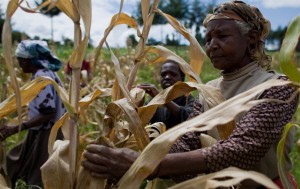
The Daily Nation (Nairobi) | 16 October 2009
Muchemi Wachira
Nairobi — All public land will be identified, registered and handed over to a National Land Commission after the proposed National Land Policy becomes law.
This will make it difficult for public land to be grabbed, a practice rampant in Kenya.
There is no system for registration of public land and it is left to the Finance ministry permanent secretary, in whose name it is registered, to safeguard it.
The proposed National Land Policy draft says the NLC will hold and manage public land on behalf of Kenyans.
Public land acquired irregularly will be repossessed, according to the draft, which Lands minister James Orengo said would be tabled in Parliament next month.
On Thursday, the parliamentary committee on land and natural resources pledged to ensure that the draft was passed.
Key offices
The MPs, led by chairman Mutava Musyimi were briefed on the contents of the document at a one-day workshop.
The draft says that two key offices will be established under the NLC -- keeper/recorder of public lands and the land titles tribunal.
While the first will prepare and maintain a register of public land, the other will determine the bona fide ownership of previously public or trust land.
Communal land, the draft says, will also be protected from grabbers through registration of such land after it is defined and documented.
Communal land, most of which is owned by pastoralists, refers to land held, managed or used by a specific community or families.
In the greater Kajiado, Narok and Samburu, for instance, most of the land is owned by groups. In most cases, the land is registered under trust land and is held in trust by a county council.
Councils have been disposing of trust land irregularly or illegally with the connivance of members of the groups.
New document
The proposed draft says a Communal Lands Board will be set up to determine who occupies land in a given community.
Kenya does not have a clearly defined national policy, resulting in haphazard land management systems.
As a result, the government has been setting up commissions to solve the problem, the latest being the one into irregular or illegal allocation of land chaired by lawyer Paul Ndung'u.
The Ndung'u report, as it is commonly known, recommended revocation of title deeds of land acquired illegally but these are yet to be implemented.
Sizes of land will also be considered if the new document is effected.
Because of excessive fragmentation of land into sub-economic units the government, according to the draft, will ensure that all sub-divisions are related to land use "specified for different ecological zones".
To facilitate this, says the draft, the government will put in place a system to determine economically viable minimum sizes for various zones.
In areas like Kisii, Central and parts of western Kenya, land has been fragmented into small units of less than quarter of an acre.
Large chunks
And those who own large chunks of idle land could lose it if they fail to utilise it.
"To ensure that all land is productively used, the government will periodically commission field surveys on land holdings to determine levels of utilisation to ensure economic and optimal use," the proposed draft says.
Foreigners and foreign companies will also not be allowed to own land in the country but can acquire leaseholds not exceeding 99 years, the draft says.
At present, foreigners are allowed to own land unlike in most countries, where land ownership is restricted to citizens.
In areas like Laikipia and parts of Coast Province, large chucks of land are owned by foreigners operating ranching schemes or carry out large-scale farming. The draft does not say what will happen to foreigners or foreign companies owning land.
To protect the country's natural resources, the proposed policy says the government will compulsorily acquire all land on which mineral resources are found to protect local residents from exploitation.
It will also ensure that acquisition of land for investment purposes is in line with national development objectives.
All people displaced from their original land will also be resettled.
Apart from resettling them, the government will also establish a policy for dealing with such issues.
In a dilemma
Kenya found itself in a dilemma after the number displaced people shot up following the 2007 post-election violence when more than 3,500 families were flung from their homes.
The government will, for the first time, educate Kenyans on the law of succession.
According to the proposed draft, the law will harmonise inheritance, which entails the transfer of land rights from one living person to another.
Some people file succession cases without informing family members and end up getting the lion's share or excluding their kin from inheriting ancestral land.
This will no longer be the case if the new draft becomes law.












